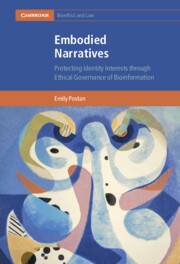Embodied Narratives
Increasing quantities of information about our health, bodies, and biological relationships are being generated by health technologies, research, and surveillance. This escalation presents challenges to us all when it comes to deciding how to manage this information and what should be disclosed to the very people it describes. This book establishes the ethical imperative to take seriously the potential impacts on our identities of encountering bioinformation about ourselves. Emily Postan argues that identity interests in accessing personal bioinformation are currently under-protected in law and often linked to problematic bio-essentialist assumptions. Drawing on a picture of identity constructed through embodied self-narratives, and examples of people’s encounters with diverse kinds of information, Postan addresses these gaps. This book provides a robust account of the source, scope, and ethical significance of our identity-related interests in accessing – and not accessing – bioinformation about ourselves and the need for disclosure practices to respond appropriately. This title is also available as Open Access on Cambridge Core.
Emily Postan is a Chancellor’s Fellow in Bioethics at the University of Edinburgh Law School and a deputy director of the J Kenyon Mason Institute for Medicine Life Sciences and the Law. Her principal research interests lie in the ethical and regulatory implications of the impacts of health technologies and health data on our identities, group memberships, and relationships with others. Her wider research includes work in neuroethics, reproductive ethics, and regulation of health research.

